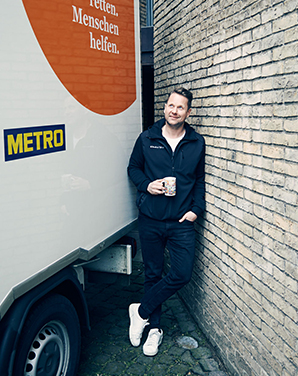Environmental matters
Our approach is to significantly reduce the climate-relevant emissions caused by our business operations and resulting from our supply chain as well as to decrease our consumption of natural resources1Due to the company size and alignment (management), the aspect of environmental concerns is not significant for the holding company, METRO AG.. We do this by focusing on behavioural change (Energy Awareness Programme) and investment aimed at increasing our energy efficiency (Energy Saving Programme). We also operate a global energy management system that identifies potential savings in our stores and monitors our overall savings targets. In financial year 2019/20, we reduced electricity consumption in our METRO stores by 7.9% in comparison to the previous year and thus clearly exceeded our target of 3.4%. Effects of Covid-19 were observed only locally and with small fluctuations. We cannot quantify the exact impact of the pandemic on our energy consumption performance. Therefore, the key figures presented here as well as the conversions into CO2 equivalents were included in the reporting in relation to the base year 2011 or the previous year. The corresponding assessments refer to this basis of comparison. Furthermore, we are also converting our cooling systems to natural refrigerants (F-Gas Exit Programme), insofar as it is possible. This reduces our energy requirements as well as our costs. In financial year 2019/20, among other things, we invested €5.1 million in METRO’s Energy Saving Programme, which saves us approximately €1.4 million in energy costs each year. Examples of measures in the reporting year are:
- The first transcritical ejector refrigeration plants were put into operation in Slovakia, as well as in further projects in Germany, France, Italy, Belgium and Romania.
- The last CFC systems were replaced by natural refrigerants in all stores in Russia.
- Another 14 photovoltaic systems were installed in France, Belgium, Bulgaria, Austria, India and Pakistan, with a total additional capacity of 7,086 kWp.
- 460 charging stations for electric vehicles were installed for METRO customers. At the Düsseldorf Campus, 170 employees already use electric vehicles as company cars, whose emissions are offset by certificates for hydroelectric power plants.
- METRO uses an internal CO2 price, which was raised to €50 per tonne of CO2 in 2019. We use the CO2 price to approve energy-efficient projects with lower financial savings. METRO is a member of the Task Force on Carbon Pricing in Europe, which aims to put a price on all relevant carbon emissions and thus achieve market- and competition-based decarbonisation.
In addition, we are currently conducting a comprehensive climate change scenario analysis for the local and international fruit and vegetable supply chain at METRO.
This is METRO’s response to risks identified in initial scenario analyses (as recommended by the Task Force on Climate-related Financial Disclosures, or TCFD) in our business operations as well as in our supply chain:
- Physical risks resulting from extreme weather events and water stress (scarcity or flooding)
- Risks of business interruptions due to extreme weather events and risks caused by declining economic power
- Transition risks such as rising prices for CO2 emissions (with short-term impact on costs and product prices)
- Risks of resource scarcity and associated price increases (for example for agricultural products in the next 5 to 10 years)
- Risks caused by investments in new technologies (carbon-neutral cooling units planned worldwide until 2030) and investments in the generation of renewable energies (extensive installation of solar systems planned until 2030)
We incorporate these risks in our medium-term risk management and assess risks for sales and costs, particularly those based on rising prices and decreasing availability of resources, taking social concerns into account. No risks subject to mandatory disclosure pursuant to § 289c Section 3 Sentence 1 Nos. 3 and 4 of the German Commercial Code (HGB) were identified.
Further key topics in relation to sustainable business operations are the prevention of waste, the reuse and multiple applicability of resources and their recovery by means of recycling. The reduction of food waste is an issue of particular importance to the operations of METRO. METRO has therefore committed itself to the Resolution on Food Waste by the Consumer Goods Forum (CGF) and thus to eliminate 50% of wasted food in our own operations by the year 2025 compared to 2016. We are currently working on updating this target. In 22 countries we cooperate with food service organisations and social institutions in order to avoid food waste in the stores, including our restaurants and warehouses. In addition, 9 of these countries cooperate or plan to cooperate with Too Good To Go in order to reduce food waste in their own operations (wholesale store and restaurant) and in joint efforts with customers. METRO is a member of the ‘10x20x30’ initiative and involves 20 of its most important business partners to reduce food waste along the supply chain. Since October 2019, METRO has been a partner of Matsmart, a Swedish start-up that resells surplus food in the B2B business and thus contributes to waste reduction.
Status of climate protection target
From October 2019 to September 2020, METRO generated 247 kg of CO2-equivalents per square metre of selling and delivery space. This figure is down from 267 kg in the previous year’s period. Our goal is to reduce these emissions by 50% to 188 kg by 2030 compared with 2011. With the 34.3% savings we have achieved so far, we are on the right track. In 2019, METRO expanded the climate target to the supply chain and as the first German wholesale company set a recognised science-based target for itself. In it, METRO AG undertakes to reduce its Scope 1 and Scope 2 CO2 emissions by 60% per square metre of selling and delivery space by 2030 compared to 2011. A reduction of 31.1% has been achieved in this area since 2011. Furthermore, METRO AG is committed to reducing absolute Scope 3 CO2 emissions (supply chain) by 15% by 2030 compared to 2018. Our goals for Scope 1 and Scope 2 are thus in line with the reductions required to keep global warming well below 2 °C by 2100 compared to pre-industrial levels.

